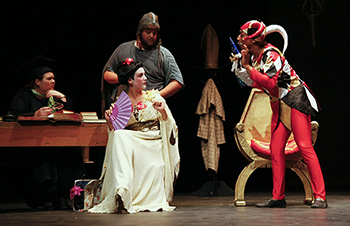 |
The National Arts Council (NAC) has awarded R100 000 to 10 Drama students at the University of the Free State (UFS). Eight years after its establishment in 2005, the NAC has partnered our university in funding academically-deserving students needing assistance with tuition. To date, our undergraduate students have benefitted from more than R800 000.
Prof Nico Luwes, Head of the Department of Drama and Theatre Arts, who applies to the NAC at the end of each year on behalf of students, welcomes the funds: “Quite a lot of our students would not have been able to complete their studies without assistance from the bursary scheme.”
As a result of this financial injection, South African schools also gain. “Some students then enrol for a higher education diploma, and they then teach Arts and Culture at schools. Hence, there is a whole new generation of Arts and Culture teachers who are now entering the school system,” said Prof Luwes.
Mbuyiselo Nqodi, a second-year BA Drama and Theatre Arts student, would not have been able to enrol at the university in 2015, had it not been for the NAC. “Without the bursary, I would not have been admitted into the university. It helped a lot because R10 000 can go a long way.”
Pursuing its mandate to support and develop South Africa’s arts, culture and heritage sector, the NAC awarded 117 bursaries to arts students and tertiary institutions for the year. A total of R5 million has been allocated for 2016, a 10% increase on the previous financial year.
According to the NAC Chief Executive Officer, Rosemary Mangope, one of the aims of the NAC is to provide support to students who will contribute to the arts and culture industry in a meaningful and sustainable manner.